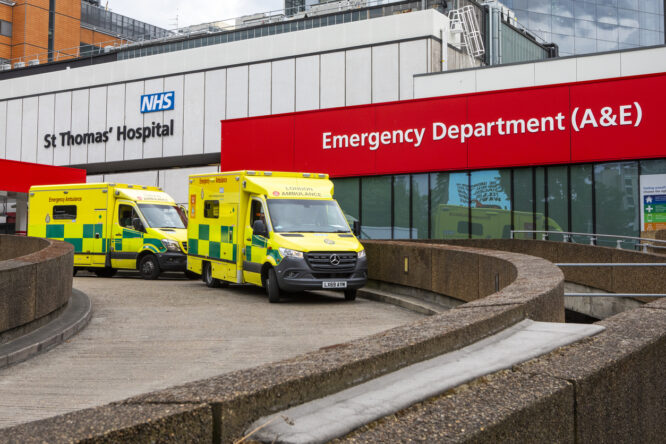The NHS has long been seen as one of the UK’s defining institutions—an emblem of shared values, fairness, and dignity in care.

However, if it were ever dismantled or fully privatised, as certain political parties are desperate to do (and slowly accomplishing, it seems), the consequences would reach far beyond hospital walls. Here’s what would likely happen, and why it would touch nearly every corner of British life.
1. Access to healthcare would become based on income, not need.

One of the NHS’s core principles is that care is free at the point of use, regardless of income. If that system goes, so does that guarantee. People would need insurance, or the funds to cover treatment themselves, and not everyone could afford it. The result? Delays in care for lower-income households, wider health inequalities, and a growing divide between those who can manage ongoing health costs and those who can’t. Health would stop being a right and start becoming a privilege.
2. A surge in untreated illness would hit public health hard.

If costs start deterring people from seeking help early, many conditions will go untreated until they’re critical. People will skip appointments, put off prescriptions, and avoid hospitals altogether, leading to worse outcomes across the board.
This isn’t just about individuals—it affects communities. The return of preventable outbreaks, mental health crises left to escalate, and chronic illness becoming more severe would put new pressure on everything from schools to employers to emergency services.
3. Private health insurance would become a new financial burden.

With the NHS gone or hollowed out, health insurance would become essential, not optional. However, unlike in systems such as the US, where employer insurance is common, most British workers and families aren’t set up for that. The cost would land hard, especially on younger adults, gig workers, and people with chronic conditions. Monthly premiums, excess charges, exclusions for pre-existing conditions—it would all become part of everyday life, like rent or bills.
4. Emergency care would slow down, or become means-tested.

Right now, you can call an ambulance, go to A&E, and be seen without thinking about money. If the NHS is dismantled, even emergency care could come with upfront costs or long waits unless you’re insured. That delay could cost lives. People would second-guess whether they “really need” help. Even those with insurance might find themselves tangled in policy rules while someone’s bleeding or struggling to breathe.
5. GP access would become patchy and expensive.

Imagine having to pay £40 just to speak to your GP, or £80 for a same-day appointment. In a post-NHS UK, that’s not far-fetched. Private GP services already exist, and they’re expensive, even for short appointments. The result? Fewer people getting early diagnoses. Less continuity of care. More avoidable conditions turning serious. It’s the quiet collapse of one of the NHS’s most powerful strengths: universal access to your first line of defence.
6. Mental health support would become even harder to access.

NHS mental health services are already under pressure, but at least they exist without upfront fees. In a private system, therapy, crisis care, and psychiatric services would move even further out of reach for many. Mental health support would become something only the well-off could afford regularly. That would widen existing social divides, with vulnerable people left to cope alone or turn to overstretched charities and emergency departments.
7. Long-term health conditions would become financially devastating.

Diabetes, asthma, cancer, arthritis—millions live with these every day. Right now, the NHS helps manage that load through free prescriptions, regular check-ups, and access to specialists. Without it, the cost of simply staying well could be enormous.
Patients might have to choose between medication and rent. Between attending physio or buying groceries. A dismantled NHS would turn manageable conditions into ongoing financial stress, especially for those already on lower incomes.
8. Social care would collapse further without NHS support.

The NHS quietly props up social care—by stepping in when carers are unavailable, offering respite beds, and coordinating between hospital and home. Without it, already strained services would break down faster. This would hit the elderly and disabled hardest. More people would end up stuck in hospital beds because there’s no safe place to discharge them to. Others would simply fall through the cracks, left without support or supervision at home.
9. Health workers would be spread thin, or driven out altogether.

Many NHS staff stay in the system because of its mission, not the money. Remove that, and add corporate targets, pressure to reduce costs, and inequities in patient care, and staff morale would collapse. Some would leave, while others would move abroad, and many more would burn out. A dismantled NHS wouldn’t just create gaps in service—it would lead to mass shortages of qualified, compassionate professionals.
10. National identity and social trust would take a serious hit.

The NHS isn’t just a service—it’s something that defines how the UK sees itself. It represents collective care, equality, and the belief that no one should suffer just because they’re poor or unlucky. If it goes, it won’t just be healthcare that suffers. Social trust would erode. People would become more individually focused, less community-minded, and one of the few remaining shared institutions that unites the country would quietly vanish.




